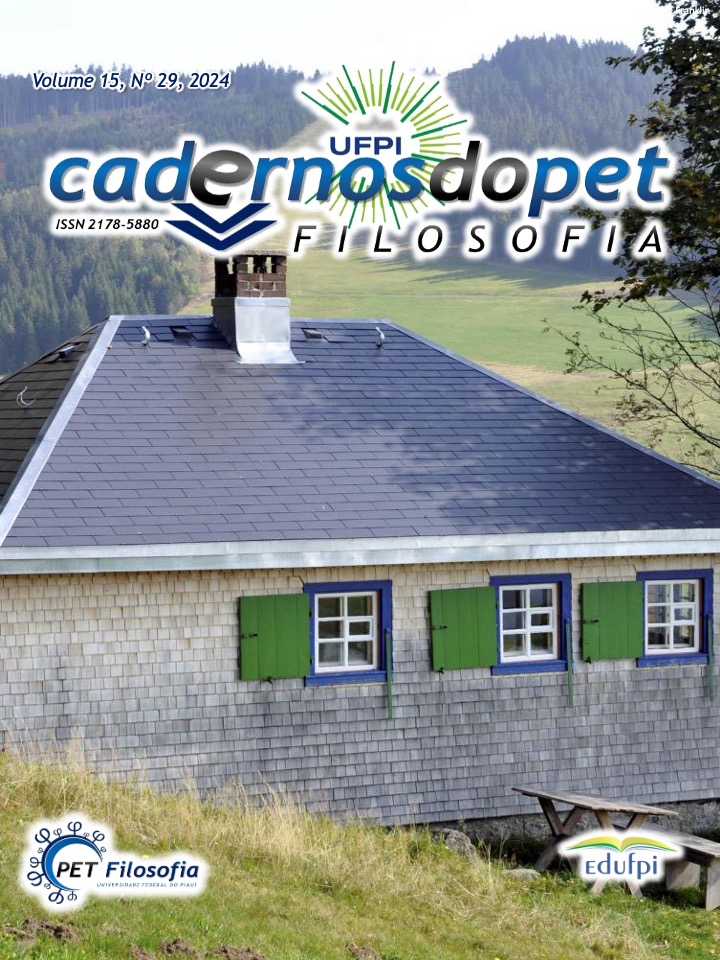A ABERTURA FENOMENOLÓGICA DA ESFERA DA VIVÊNCIA CONTIDA NA ANALÍTICA DA EXISTÊNCIA DE MARTIN HEIDEGGER
REPENSAR AS CIÊNCIAS PARA ALÉM DO PRIMADO TEORÉTICO
DOI:
https://doi.org/10.26694/cadpetfilo.v15i29.5966Keywords:
Ciência; Mundo; Mundanidade; Filosofia; OntologiaAbstract
This article discusses the limits of the modern conception of Science arising from the fracture established between scientific and philosophical knowledge. For a long time, Sciences remained apart from ontological reflections due to the presumed abyss between Science and Philosophy. At this core, the work begins by describing the problem of knowledge in Modernity to demonstrate its ontological impertinence through the adoption of the phenomenological framework mobilized by Martin Heidegger. Modern Sciences, because they are based on the Cartesian scientific model and worldview, read reality as external data, so that the experience inherent to the world experience was not considered. We then start from the interpretation that the primary cause of this negligence lies in the path of gnosiological reduction of ontology. For Sciences to contemplate human experience, it is essential to uncover its inescapable ontological foundation. Philosophical thinking, along this path, plays a fundamental role in the (re)construction of Sciences, as it seeks the causes and principles of knowledge of reality. For this purpose, the topic of worldliness of the world was chosen, according to Heidegger's reading, capable of being discussed through the necessary foray into ontology. The phenomenological opening of the sphere of experience, contained in the notion of worldliness as it presupposes the understanding of the surrounding world, makes it possible to resize the way of conceiving Sciences.
References
ABBAGNANO, Nicola. Dicionário de Filosofia. São Paulo: Martins Fontes, 2007.
ABBAGNANO, Nicola. História da filosofia. V. 4. Lisboa: Editorial Presença, 1970a.
ABBAGNANO, Nicola. História da filosofia. V. 10. 3 Ed. Lisboa: Editorial Presença, 1970b.
ABBAGNANO, Nicola. História da filosofia. V. 11. Lisboa: Editorial Presença, 1970c.
HEIDEGGER, M. A origem da obra de arte. Lisboa, Portugal: Edições 70, 1977. 73p.
HEIDEGGER, M. A coisa. In: SOUZA, Eudoro. Mitologia. Lisboa, Portugal: Guimarães Editores, 1984. 271p.
HEIDEGGER, M. Construir, habitar, pensar. Conferência pronunciada por ocasião da "Segunda Reunião de Darmastad", publicada em Vortäge und Aufsätze, G. Neske, Pfullingen, 1954. Tradução de Márcia Sá Calvalcante Schuback.
HEIDEGGER, M. Prolegómenos para una historia del concepto de tiempo. Lecciones de verano 1925. Madrid. Alianza. 2006.
HEIDEGGER, M. Ser y Tiempo. Traducción prólogo y notas de Jorge Eduardo Rivera. Edición digital de: http://www.philosophia.cl.
HEIDEGGER, M. Ser e Tempo. Petrópolis: Vozes, 2015. 598 p.
HEIDEGGER, M. La idea de la filosofía y el problema de la concepción del mundo. Lecciones del semestre de invierno. Barcelona, Herder, 2005.
MORENTE, Manuel García. Fundamentos de Filosofia: lições preliminares. São Paulo: Editora Mestre Jou, 1980.
REALE, Giovane; ANTISERI, Dario. História da Filosofia: do humanismo a Kant. São Paulo: Paulus, 1990. Coleção História da Filosofia, volume 3.
REALE, Giovane; ANTISERI, Dario. História da Filosofia: do humanismo a Descartes. V. 3. São Paulo: Paulus, 2004.
REALE, Giovane; ANTISERI, Dario. História da Filosofia: do Romantismo ao Empiriocriticismo. V. 5. São Paulo: Paulus, 2005.
REALE, Giovane; ANTISERI, Dario. História da Filosofia: de Nietzsche a Escola de Frankfurt. V. 6. São Paulo: Paulus, 2006.
RUSSELL, Bertrand. História da Filosofia Ocidental. São Paulo: Companhia Editora Nacional, 1957).
ZILLES, Urbano. Teoria do conhecimento. 5ª. ed. Porto Alegre: EDIPUCRS, 2006.








